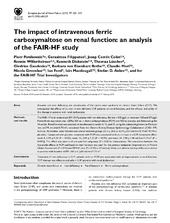The impact of intravenous ferric carboxymaltose on renal function: An analysis of the FAIR-HF study
Ponikowski, Piotr; Filippatos, Gerasimos; Colet, Josep Comin; Willenheimer, Ronnie; Dickstein, Kenneth; Luscher, Thomas; Gaudesius, Giedrius; Von Eisenhart Rothe, Barbara; Mori, Claudio; Greenlaw, Nicola; Ford, Ian; Macdougall, Iain; Anker, Stefan D.
Peer reviewed, Journal article
Published version

Åpne
Permanent lenke
https://hdl.handle.net/1956/11792Utgivelsesdato
2015-02-11Metadata
Vis full innførselSamlinger
- Faculty of Medicine [31]
Originalversjon
https://doi.org/10.1002/ejhf.229Sammendrag
Aims Anaemia and iron deficiency are constituents of the cardio-renal syndrome in chronic heart failure (CHF). We investigated the effects of i.v. iron in iron-deficient CHF patients on renal function, and the efficacy and safety of this therapy in patients with renal dysfunction. Methods and results The FAIR-HF trial randomized 459 CHF patients with iron deficiency (ferritin <100 μg/L, or between 100 and 299 μg/L if transferrin saturation was <20%): 304 to i.v. ferric carboxymaltose (FCM) and 155 to placebo, and followed-up for 24 weeks. Renal function was assessed at baseline and at weeks 4, 12, and 24, using the estimated glomerular filtration rate (eGFR, mL/min/1.73m2), calculated from the Chronic Kidney Disease Epidemiology Collaboration (CKD–EPI) formula. At baseline, renal function was similar between groups (62.4±20.6 vs. 62.9±23.4 mL/min/1.73m2, FCM vs. placebo). Compared with placebo, treatment with FCM was associated with an increase in eGFR [treatment effect: week 4, 2.11±1.21 (P = 0.082); week 12, 2.41±1.33 (P = 0.070); and week 24, 2.98±1.44 mL/min/1.73m2 (P = 0.039)]. This effect was seen in all pre-specified subgroups (P > 0.20 for interactions). No interaction between the favourable effects of FCM and baseline renal function was seen for the primary endpoints [improvement in Patient Global Assessment (P = 0.43) and NYHA class (P = 0.37) at 24 weeks]. Safety and adverse event profiles were similar in patients with baseline eGFR <60 and ≥60 mL/min/1.73m2. Conclusions Treatment of iron deficiency in CHF patients with i.v. FCM was associated with an improvement in renal function. FCM therapy was effective and safe in CHF patients with renal dysfunction.
